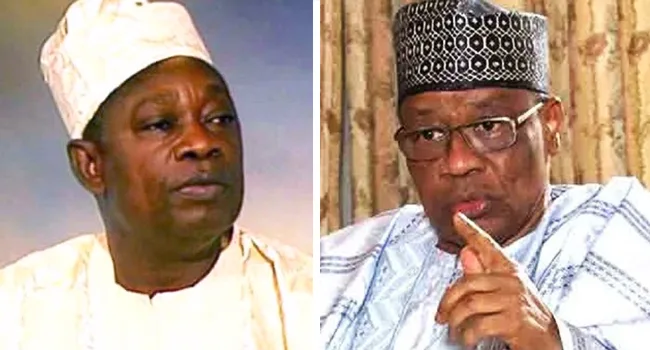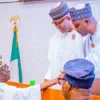Thirty-two years after the controversial annulment of Nigeria’s June 12, 1993, presidential election, former Head of State Ibrahim Babangida has, for the first time, admitted that the late Moshood Kashimawo Olawale (MKO) Abiola won the election.
This startling revelation was made in Babangida’s memoir, A Journey in Service: An Autobiography of Ibrahim Babangida, which was launched in Abuja on Thursday in the presence of notable dignitaries from across the continent and Nigeria.
The book’s reviewer, former Vice President Yemi Osinbajo, highlighted that Babangida, often referred to as the “evil genius” and “Maradona” for his political maneuvering, addressed the long-debated question of Abiola’s victory in his memoir.
In the book, Babangida reflected on his earlier stance, acknowledging that, after closer examination of the election results, there was no doubt that Abiola had won. “Although I initially stated after the election that Abiola may not have won, upon further reflection and review of the results published as an appendix in this book, it is clear that MKO Abiola won,” Babangida wrote. He went on to emphasize that Abiola met the two critical requirements for winning the election: securing the majority of votes (8,128,720 against Bashir Tofa’s 5,848,247) and achieving the necessary geographical spread, including one-third of the votes in 28 states and Abuja.
Babangida’s admission gives weight to former President Olusegun Obasanjo’s earlier claim that, had it not been for “bad belle” (ill will), Abiola would have become Nigeria’s president. The annulment of the election sparked widespread protests, and Abiola, bolstered by clear evidence of his electoral victory, declared himself president.
However, his mandate was denied, and he was imprisoned by the military regime of Sani Abacha, Babangida’s former chief of defense staff. Abiola tragically died in custody under suspicious circumstances in 1998, at the age of 60. His wife, Kudirat, was assassinated in 1996.
The June 12 election has remained a focal point of political discussions, with groups like the National Democratic Coalition (NADECO) and Afenifere persistently calling for justice for Abiola and the Yoruba people. In 2018, President Muhammadu Buhari moved Nigeria’s Democracy Day from May 29 to June 12, in honor of Abiola and to commemorate one of the freest elections in the nation’s history.
In his memoir, Babangida expressed appreciation for Buhari’s recognition of Abiola’s legacy. “Looking back now, the June 12 saga was undeniably the most challenging and, in many respects, one of the most painful moments of my life,” he wrote. “If I had to do it all over again, I would do it differently.”
The book launch featured an impressive guest list, including former Presidents Goodluck Jonathan, Yakubu Gowon, and Abdulsalami Abubakar, former Vice Presidents Atiku Abubakar and Namadi Sambo, as well as President Bola Tinubu and Vice President Kashim Shettima. Prominent business figures like Aliko Dangote, Abdulsamad Rabiu, and Folorunsho Alakija were also in attendance. Notably, former President Muhammadu Buhari was represented, while Obasanjo was absent. Ghana’s former President Nana Akufo-Addo was also present at the event.


